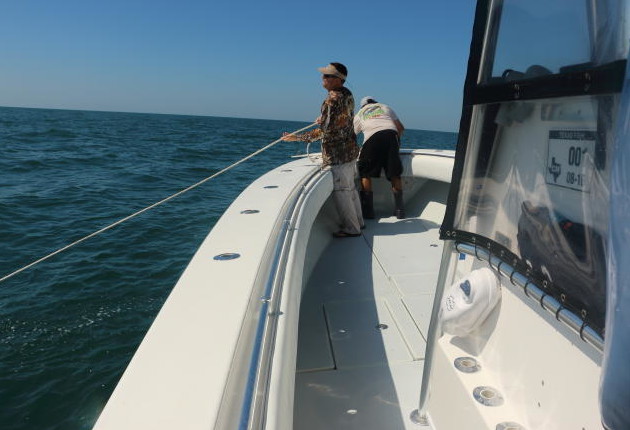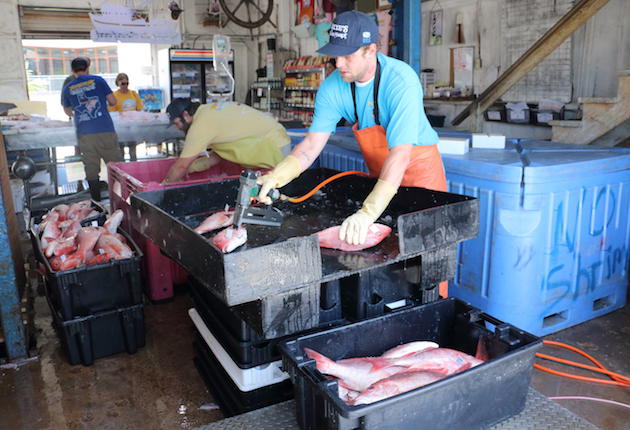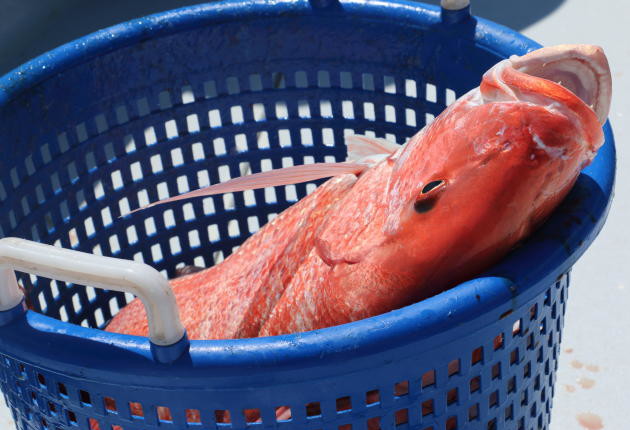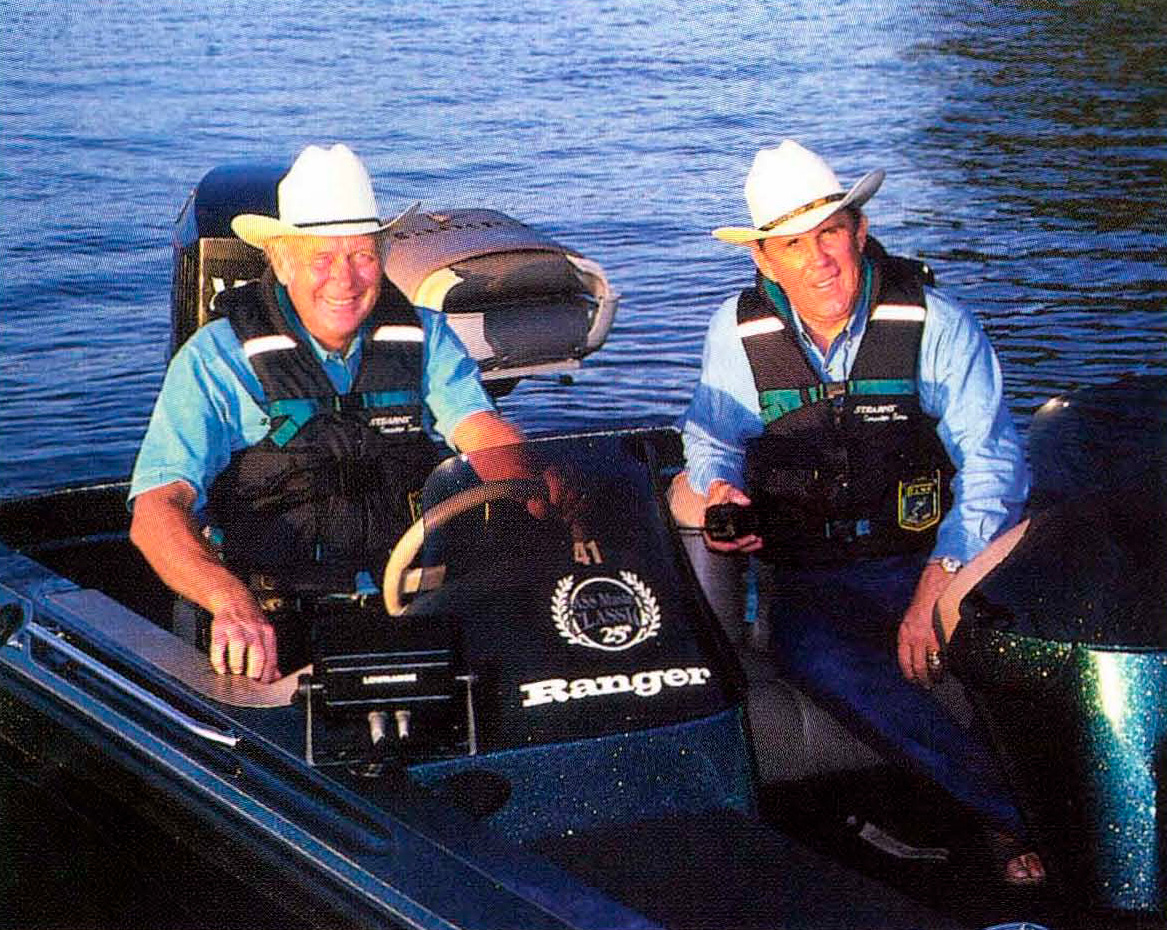Rosy red snapper in a bold blue basket is a contrast of colors screaming for lens attention. I can’t help working the scene with my camera, but the photo session is cut short.
“Take pictures later. Fish now,” says Scott Hickman, Circle H Outfitters and Charters owner.
Hickman, with 30 years as a charter boat captain, is now a commercial fisherman. He’s the Gulf’s first catch-share operation fishing with tourists as his crew. He made the change in 2014.
“Let’s me harvest fish when I want to and how I want to,” he says. “And none are getting thrown back.”
Hickman is referring to high-grading — throwing back smaller snapper when a bigger one comes to the boat. It happens, and it skews stats. More fish die than are reported because throwbacks pulled from deep water don’t do well after surfacing quickly. Despite release, they often die.

A handful of charter captains are shaking up the way their clients participate when onboard a fishing vessel.
For a fishery in rebuild mode, that’s no good.
“The middle of rebuilding tends to be the most contentious and most politically challenging moment,” says Jeff Waters, Ocean Conservancy director of government relations. “The rebuild of the fishery is amazing, but the reality is, a nine- to ten-day fishing season? That’s not a good thing.”
In federal water, red snapper season for recreational fisherman is short and the limit is low. Hickman, as a commercial operation, doesn’t have the two-bag limit, so the temptation to throw back small fish when bigger reds bite is gone. Hickman is paid on poundage and every pound counts at day’s end. That’s why he wants me to keep hooking snapper instead of snapping photos. And that’s why Hickman’s innovative way of doing business rubs other fishing sectors the wrong way.
He’s not a charter. He’s not a weekender. He’s a commercial outfit with recreational fishermen on board. Fishermen who most likely can’t afford a boat like Hickman’s, which costs more than most houses, but still want an ocean fishing experience; fishermen who don’t pay Hickman to guide them, but are more than welcome to buy his poundage at market as soon as they reach the fish house at the marina.
That’s where Hickman has to go before he and his crew of tourists can call it a day. Those tourists pay premium prices for seafood. Fresh fish caught daily costs twice as much as traditional commercial catches coming in several days later.

Catching your own fish straight from the ocean means a better experience on the boat and at the dinner table.
“What these charter-for-hire guys have done is really interesting. They’ve taken the long view on this,” says Shane Cantrell, Charter Fisherman’s Association executive director and commercial permit holder just like Hickman. “We’re by no means finished. There’s a lot of opposition to it, but this is going in the right direction.”
The recreational red snapper season in the Gulf opens today, June 1. Hickman and Cantrell have been working on the same species for five months by this point. It seems like they have the advantage, but maybe not. Their creative strategy to abandon bag limits for pounds paid doesn’t always cash out, especially with me on board. I lose more bait than I use. Having tourists as crew doesn’t guarantee catch.
“This is a production-based system. If I’m not producing, I’m not fulfilling my end of the deal,” Cantrell says. “So far in the history of these catch-share trips that has only happened a handful of times. We put faith in ourselves and our abilities to go out there and harvest fish day in and day out.”
Jumping ship from charter to commercial is a revolt that’s still in its infancy. Only 14 of nearly 12,000 charters in the Gulf have followed Hickman’s lead. The catch-sharing risk is too great for most charter-for-hires that are used to being paid regardless of how the fishing trip goes. But with a red snapper fishery that’s gone over quota ten out of the last 15 years, there’s more at risk than revenue.
Kris Millgate is an outdoor journalist based in Idaho Falls, Idaho. See more of her work at www.tightlinemedia.com.





With recreational fishemen only getting 25% of the TAC, they are forced into the only game in town if they want to catch fish. This is an abortion of the fisheries management system where 75% of the TAC is held by for profit and the majority of anglers are held holding an empty bag. Recreational fishing dwarf the commercial fishery in monetary and in number of fishermen, yet are stuck with the crumbs.
That being said, having states individually manage this fishery may be worse. A major change in the Federal allocation of the red snapper fishery would fix this and provide the most revenue for the nation.